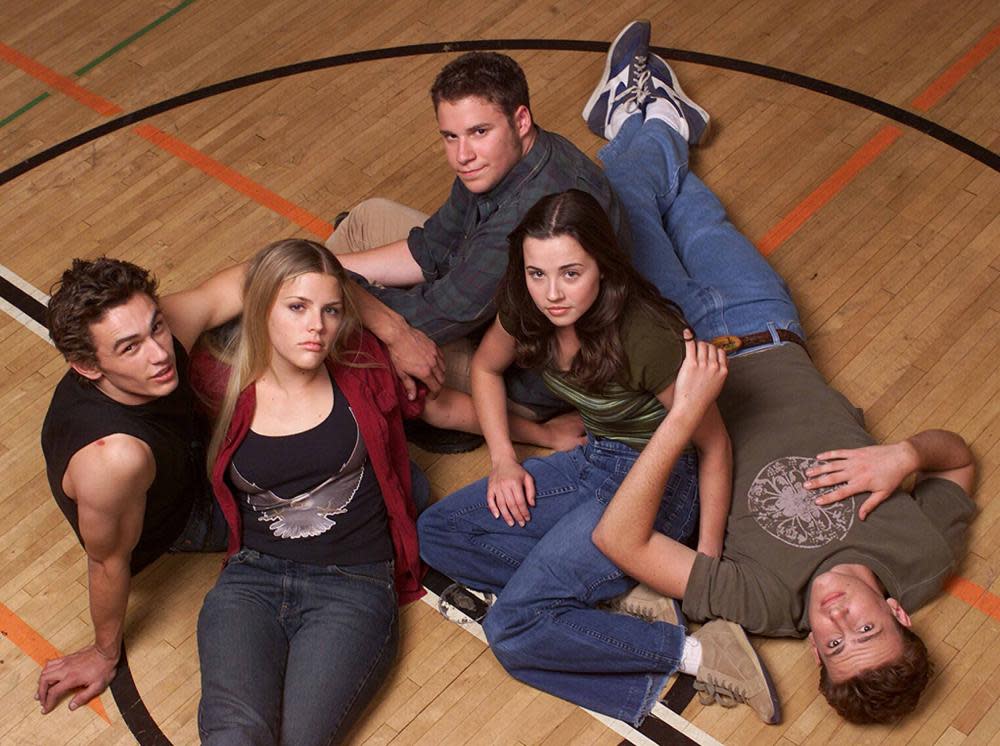Freaks and Geeks: hilarious, moving and endlessly quotable teen show for the ages

Growing up is a lonely business. Films and television shows have unpacked the agony of adolescence for years, but few have captured it as beautifully or authentically as Freaks and Geeks, Paul Feig’s 1999 comedy-drama that was criminally axed after just one season.
The show is known for launching a number of high-profile careers. It was executive produced by Judd Apatow, who would go on to work extensively with cast members James Franco, Jason Segel and Seth Rogen in films such as Knocked Up and Forgetting Sarah Marshall. Busy Philipps went on to star in Dawson’s Creek and beyond; Lizzy Caplan and Rashida Jones have minor parts. (Apatow worked with many of the actors on Undeclared in 2001, also cancelled after one season.)
But it would be remiss to see Freaks and Geeks merely as a launchpad. The show set a new benchmark for the possibilities of teen drama, and holds up decades later, with its only major flaw being its glaring lack of racial diversity.
Related: Puberty Blues: the joy, brutality and complexity of life growing up on Australia's beaches
Set in 1980 in a fictional suburb of Detroit, the show follows siblings Lindsay (Linda Cardellini) and Sam Weir (John Francis Daley) and their respective cliques during a school year at William McKinley High.
The siblings are outcasts of different kinds. Lindsay, 16, is a brainy mathlete trying to shed her good-girl image. She dons her father’s old army jacket, ditches her religious best friend and joins the pot-smoking burnouts: Daniel Desario (Franco), Nick Andopolis (a gorgeously dopey Segel), Ken Miller (Rogen) and mean girl Kim Kelly (Philipps). Her virtuous nature, however, still sets her apart.
One of the most honest and endearing portrayals of the painful, awkward ordinariness of being a teenager
Sick of being mercilessly taunted for being geeks, Sam, 14, and his friends Neal Schweiber (Samm Levine) and Bill Haverchuck (Martin Starr) dream of reinvention, too, but worshipping at the altar of Steve Martin and Star Wars doesn’t get you too far in the cutthroat world of high school in 1980.
At home, the siblings are coddled by their overprotective parents (Joe Flaherty and Girls’ Becky Ann Baker), who must slowly learn to let go.
Despite this familiar ground, Freaks and Geeks’ approach is unique and affecting. Unlike many other teen shows of the era, it doesn’t rely on melodrama; instead, situations unfold quietly, often without resolution. The topics explored are frequently heavy – sexuality, infidelity, ableism, bullying – and the show’s clever craft allows the viewer to feel the weight and confusion of these things through the eyes of a teenager experiencing them for the first time. It’s also hilarious and endlessly quotable (three words: Parisian night suit).

Characters reveal their depths gradually. There’s a deeply moving scene involving the geeks’ bully Alan White (Chauncey Leopardi) as he’s confronted with his conflicting desires, and the slow, complex friendship between Kim and Lindsay reveals biting truths about young womanhood. Some of the best characters are secondary or fleeting: Gordon Crisp (Jerry Messing), an acquaintance of the geeks, suffers from trimethylaminuria, a disorder that causes his body to emanate a fishy odour. Yet despite this, he’s optimistic and kind, demonstrating self-knowledge and acceptance beyond his years. Elder geek Harris Trinsky (Stephen Lea Sheppard) dispenses droll gems of zen wisdom, subtly stealing the show every time he’s on screen.
Related: Mother and Son: the great Australian sitcom is a masterclass in the art of the squabble
Music is a central aspect of the show, positioning it in its 1980s setting as well as driving the story. Aspiring drummer Nick is inconsolable about the passing of Led Zeppelin’s John Bonham; a memorable scene sees an awkward school dance moment turn joyous to Styx’s Come Sail Away. The Grateful Dead comes to play a pivotal role in Lindsay’s life. These sharp soundtrack choices illustrate that very teenage thing – losing oneself in music as an escape from a lonely suburban existence.
Recent shows such as PEN15 and Sex Education owe a great deal to Freaks and Geeks, which remains one of the most honest and endearing portrayals of the painful, awkward ordinariness of being a teenager. Nostalgic for the 1980s in the same way that PEN15 is nostalgic for the 2000s, it’s a perfect crystallisation of a time, a place and a sensibility – and the universal feelings that transcend those things.


